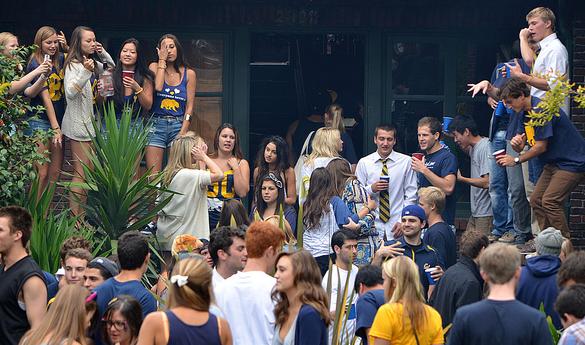COLUMN: College football and partying aren't always hand-in-hand
Partying and college are synonymous with each other. Popular culture tells us that the purpose of college is to have as much fun as possible while managing to earn a degree before facing the everyday struggles of life in the “real world.” Throw in a successful football team and you have a cornucopia of emotions, rolled into one. But when does this mixture of partying, football and college become detrimental to a student’s academics?
According to a recent study by the American Economic Journal, researchers found that students at schools with a thriving varsity football program study less and party more than students at institutions without a successful football team.
Shocking, right?
The study focused on the effects of the University of Oregon football program on student grade performance over a nine year period. Details of the study concluded that schools with successful football teams also lead to a significant drop in male students' grades compared to the grades of female students. Forty seven percent of college males were reported to party more than the 28 percent of college females.
Oregon has been a successful team for most of the nine-year span of the research, particularly with an appearance in the 2011 BCS National Championship game. The publicity that the Oregon Ducks have generated has been beneficial to the university, opening new avenues for the institution to grow and expand its campus community worldwide.
Mason doesn't have a diversity issue in any shape or form, but in an increasingly competitive market in Virginia, separating yourself from the competition has become more and more essential to building the university from top to bottom. Virginia Commonwealth University’s move to the Atlantic-10 conference this past May will gain them more TV exposure in an up-and-coming conference. Old Dominion's aggressive move to the Conference USA for basketball and its youngest program, football, widens their range to appeal to a larger audience of potential applicants.
Mason has strengthened itself as an academic and residential institution with a strong faculty and administration along with aggressive expansion on its four campuses. Building a football program would set Mason apart from other Virginia universities due to its location in the DC metro area and its strong basketball presence. Mason can make that next step to solidify itself as a solid all-around Virginia university with the establishment of a varsity football team amid the study's findings.
College students are going to find a way to party by any means necessary. It's that simple. That has been the case for decades. I use the term "college students" to define the wide majority of college students around the country, not to generalize ALL college students.
What would make for a more interesting study would be to look at the effects traditional college party movies like American Pie, Old School and Animal House have on teenagers and their decisions to party. Teens' minds are ingrained at a relatively young age that partying in college is just part of the culture and that drinking excessively comes with the territory. The researchers didn't take into affect those underlying influences to the college culture of partying.
Yes, a successful team will cause more school pride which leads to increased partying, but the same can be said for other varsity sports. If the purpose of the study is to rid schools of varsity football programs, the NCAA will have a straight answer—absolutely not. College football generates millions of dollars in TV revenue each year, and teams like Oregon that are consistently at the top of the sport receive not only sums of that revenue but the exposure of the football team is a factor that drives the number of applicants and donors and impacts the recognition the school receives.
The research is telling and shows a negative effect of having a notable football program but the researchers don't take into account the upsides that football programs can provide an institution. Admissions, national exposure, increased alumni donations and corporate sponsorships (Nike) boost the brand of the university and make the school a "top destination" by a larger pool of applicants.
With the findings of this report, more researchers can build off the results and conduct studies on other college campuses that have successful football and even basketball programs to get a better gauge on the overarching effects of big time college sports on student academic achievement.

